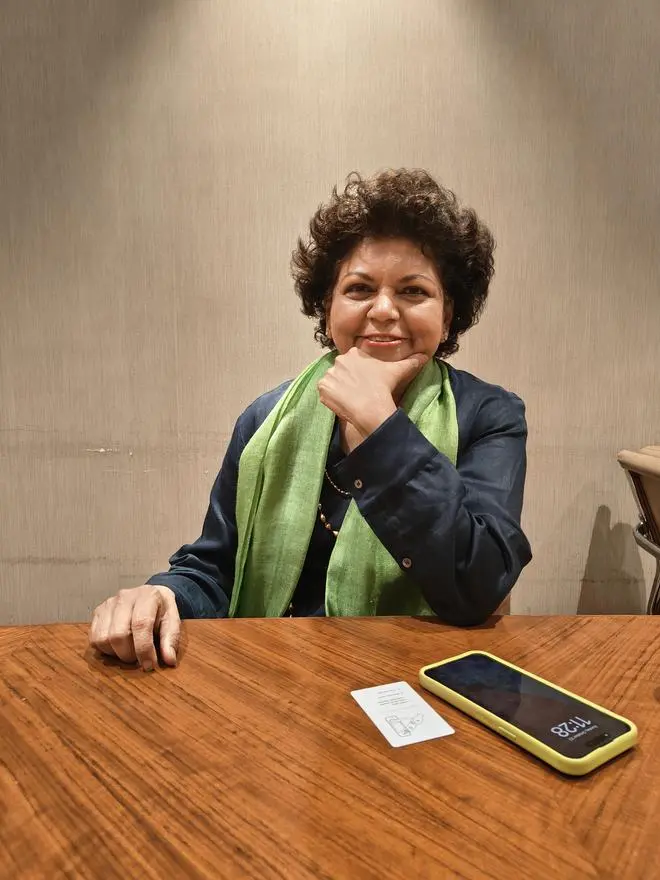“Students are a lot more vocal today and clear about what they care about. They care about grand challenges. Water security, climate, the SDGs — they feel the previous generations have failed them,” declares Chandrika Tandon, the global business leader and philanthropist who is now devoting her energies to try and transform education.
Tandon, who left a sparkling career with McKinsey, where she was the first Indian woman to become partner, has had great success with academic transformations at New York University. Post McKinsey, when she wanted to do something transformative, she met the Dean of NYU and was offered the role of a distinguished executive-in-residence. “It transpired into a 23-year old history with NYU,” she exclaims.
She got on to the board, raised money for the university and the engagement kept mushrooming leading to the creation of the NYU Tandon School of Engineering.

Chandrika Tandon | Photo Credit: Chitra Narayanan
Now Tandon is looking to do something similar at her alma mater, the 185-year old Madras Christian College in Chennai — an institution she feels deeply about. “It has a glorious history. My grandfather went there, my father studied there... I was part of the B.Com programme, it was new when I joined but became the most prestigious programme,” she says. The Chennai-born leader is now busy setting up the Boyd Tandon School of Business.
The principles for change
Why is Tandon invested so deeply in trying to usher change in education? She says there are four or five things happening concurrently that have great implications for businesses and education. The first is the constant technological revolution. “Technology is changing the way every industry works including leadership. We are suddenly talking about digital governance. How do you as a leader relate with generations of people talking a different language?” queries Tandon.
Tandon, who besides being a noted deal maker is also a Grammy-nominated singer, describes how the music industry has changed so much between her first album released five years ago and now, thanks to new technologies. “The medium of how people have measured success has changed. A few years ago it was about CD sales. Now it is about just streams,” she says.
“If I take any example from any industry, there is a seismic shift,” she continues. “This is not an incremental change. Four years ago we were talking about IOT. Now we are talking about AI, Chat GPT. On the one hand, there are all the NLP and deep learning algorithms that are changing and getting more sophisticated. On the other hand, data sets are getting cleaner and you can apply them to any field,” she says.
All this spells a big opportunity in education, she says, adding, “we have to prepare people to deal with this change.”
Warming to her theme, she says, how fields that did not exist a few years ago are big today. Take computational biology or clinical trials, where pharma companies deal with huge data sets. “Ethics becomes a big issue. How much data about you am I allowed to keep? Where do I keep it? Who has control? Who is the recipient? And then the legal system comes in,” she says.
The point she makes is that a great convergence is going on between law, science, mathematics, arts and a whole lot of other fields. Meanwhile, the whole pedagogy has also changed. “In my time at IIM, we spent a lot of time studying the basics — the basics of finance, the basics of marketing. But now if you are enterprising you can get the basics from anywhere,” she points out.
“This is where the need to flip the classroom comes in. The way Khan Academy has done; we also need to do it,” she asserts. Flipping the classroom in a masters or a B-School context, she says, is bringing in a whole new set of ideas — not just in the classroom but also giving real-world experiences. Internships play a big part. Also, she says, “before we would just talk about capstone in a master’s programme. But now we are talking about keystones, cornerstones and capstones”.
The MCC project
Her ideas and vision sound great — but the big question is execution. Where will the Boyd Tandon School get the kind of teachers who can flip the classroom?
Through alumni love is the prompt reply. She rattles off the names of MCC alumni who straddle different fields and have big achievements to their credit, and with whom she is talking to give back to the school. The advisory board to the Dean is chaired by former Citibank executive Sanjeev Thomas, Tandon’s classmate from IIM-A. Key voices like Som Mittal, ex-Nasscom, Srilata Zaheer (former Dean of Carlson School of Management), S Gopal (Chemplast) are all part of the advisory council. “We have hired two deans. Rajeshwari Krishnamurthy from Great Lakes as Dean of academics. And David Jawahar who will look after administration,” she says.
The foundation has been laid. Now, one has to watch the progress.







Comments
Comments have to be in English, and in full sentences. They cannot be abusive or personal. Please abide by our community guidelines for posting your comments.
We have migrated to a new commenting platform. If you are already a registered user of TheHindu Businessline and logged in, you may continue to engage with our articles. If you do not have an account please register and login to post comments. Users can access their older comments by logging into their accounts on Vuukle.